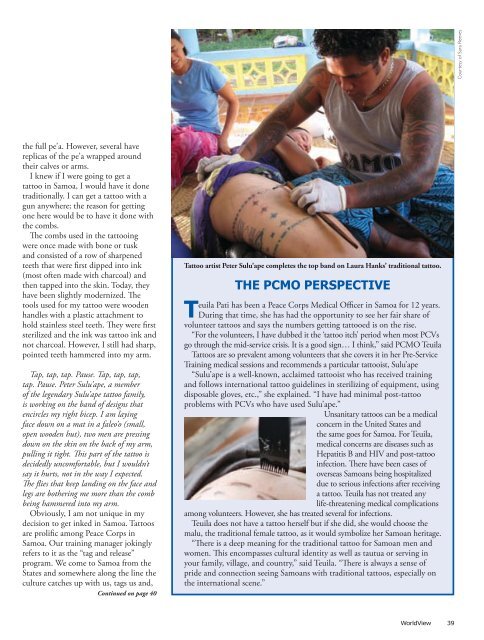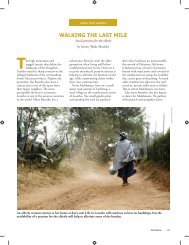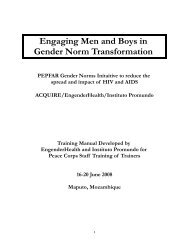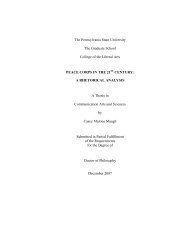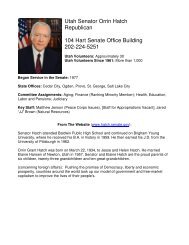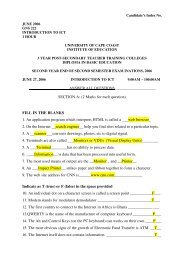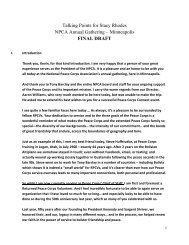special issue: inauguration 2009 - National Peace Corps Association
special issue: inauguration 2009 - National Peace Corps Association
special issue: inauguration 2009 - National Peace Corps Association
You also want an ePaper? Increase the reach of your titles
YUMPU automatically turns print PDFs into web optimized ePapers that Google loves.
Courtesy of Sara Reeves<br />
the full pe’a. However, several have<br />
replicas of the pe’a wrapped around<br />
their calves or arms.<br />
I knew if I were going to get a<br />
tattoo in Samoa, I would have it done<br />
traditionally. I can get a tattoo with a<br />
gun anywhere; the reason for getting<br />
one here would be to have it done with<br />
the combs.<br />
The combs used in the tattooing<br />
were once made with bone or tusk<br />
and consisted of a row of sharpened<br />
teeth that were first dipped into ink<br />
(most often made with charcoal) and<br />
then tapped into the skin. Today, they<br />
have been slightly modernized. The<br />
tools used for my tattoo were wooden<br />
handles with a plastic attachment to<br />
hold stainless steel teeth. They were first<br />
sterilized and the ink was tattoo ink and<br />
not charcoal. However, I still had sharp,<br />
pointed teeth hammered into my arm.<br />
Tap, tap, tap. Pause. Tap, tap, tap,<br />
tap. Pause. Peter Sulu’ape, a member<br />
of the legendary Sulu’ape tattoo family,<br />
is working on the band of designs that<br />
encircles my right bicep. I am laying<br />
face down on a mat in a faleo’o (small,<br />
open wooden hut), two men are pressing<br />
down on the skin on the back of my arm,<br />
pulling it tight. This part of the tattoo is<br />
decidedly uncomfortable, but I wouldn’t<br />
say it hurts, not in the way I expected.<br />
The flies that keep landing on the face and<br />
legs are bothering me more than the comb<br />
being hammered into my arm.<br />
Obviously, I am not unique in my<br />
decision to get inked in Samoa. Tattoos<br />
are prolific among <strong>Peace</strong> <strong>Corps</strong> in<br />
Samoa. Our training manager jokingly<br />
refers to it as the “tag and release”<br />
program. We come to Samoa from the<br />
States and somewhere along the line the<br />
culture catches up with us, tags us and,<br />
Continued on page 40<br />
Tattoo artist Peter Sulu’ape completes the top band on Laura Hanks’ traditional tattoo.<br />
THE PCMO Perspective<br />
Teuila Pati has been a <strong>Peace</strong> <strong>Corps</strong> Medical Officer in Samoa for 12 years.<br />
During that time, she has had the opportunity to see her fair share of<br />
volunteer tattoos and says the numbers getting tattooed is on the rise.<br />
“For the volunteers, I have dubbed it the ‘tattoo itch’ period when most PCVs<br />
go through the mid-service crisis. It is a good sign… I think,” said PCMO Teuila<br />
Tattoos are so prevalent among volunteers that she covers it in her Pre-Service<br />
Training medical sessions and recommends a particular tattooist, Sulu’ape<br />
“Sulu’ape is a well-known, acclaimed tattooist who has received training<br />
and follows international tattoo guidelines in sterilizing of equipment, using<br />
disposable gloves, etc.,” she explained. “I have had minimal post-tattoo<br />
problems with PCVs who have used Sulu’ape.”<br />
Unsanitary tattoos can be a medical<br />
concern in the United States and<br />
the same goes for Samoa. For Teuila,<br />
medical concerns are diseases such as<br />
Hepatitis B and HIV and post-tattoo<br />
infection. There have been cases of<br />
overseas Samoans being hospitalized<br />
due to serious infections after receiving<br />
a tattoo. Teuila has not treated any<br />
life-threatening medical complications<br />
among volunteers. However, she has treated several for infections.<br />
Teuila does not have a tattoo herself but if she did, she would choose the<br />
malu, the traditional female tattoo, as it would symbolize her Samoan heritage.<br />
“There is a deep meaning for the traditional tattoo for Samoan men and<br />
women. This encompasses cultural identity as well as tautua or serving in<br />
your family, village, and country,” said Teuila. “There is always a sense of<br />
pride and connection seeing Samoans with traditional tattoos, e<strong>special</strong>ly on<br />
the international scene.”<br />
WorldView 39


